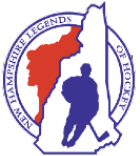Hall of Fame Members
Rod Ross
Rod Ross never played hockey — opting for football, basketball and baseball while attending Berlin High School — but his love for the sport would help shape a 43-year career in radio broadcasting, most notably for Berlin High School and Notre Dame teams, and the Berlin Maroons on WBRL.
Born in Everett, Massachusetts, and raised in Berlin, Ross was a sports enthusiast. He graduated from Berlin High School and went on to Plymouth State College, where he fell in love with theater, a passion that would encompass his life as both an actor and a director. He worked on dozens of productions through the years and has influenced hundreds of people in both school and community theater performances.
His radio career was born while he was home for the summer one year from Plymouth State, helping out his father, Charley, a radio announcer in town. Ross began at WBRL in 1964 and, over 43 years, estimated he broadcast nearly 2,000 games.
“There are two reasons why Rod was an exceptional broadcaster,” said his brother, Rusty Ross. “First, the way he would broadcast games and second, the preparation and enthusiasm he brought to the game. He obviously knew the players on the Berlin teams (and) he took the time to learn the players on the opposing team. So, it was a professional, balanced broadcast and he certainly conveyed the excitement of the game to the listeners.”
After one of his first times on the job, he asked his father what he thought of the way he was reading the news. “It was good,” said Charley, who passed away in 1962 from lung cancer at the age of 46, “but don’t read it like you’re performing Shakespeare.”
In his early years of broadcasting hockey, there were only four high school teams in New Hampshire — Concord, Hanover, and rivals Berlin High School and Notre Dame High School. That presented a challenge to Ross, a Berlin High grad since Notre Dame was on top of the rivalry in those years. He admits that he might have shown a bias for Berlin only because the Notre Dame team was so dominant.
His radio career also found him broadcasting the Berlin Maroons games, a favorite team of the North Country. He would also broadcast a few University of New Hampshire games.
Ross moved to The Villages in Florida in 2003 with his wife, Debbie, where he is the official spokesperson for the Red Sox Nation Club at The Villages. He has interviewed such notables as Rico Petrocelli, Pedro Martinez and Luis Tiant. He has also become a personal friend of Claudia Williams, the daughter of baseball great Ted Williams.
Ross credits his father for giving him the best advice for sports broadcasting: “You have to remember that the people listening can’t see what you are seeing. It is not good enough just to describe what’s happening. You have to paint a picture for them.”
Richard W. Osborne
In 1966, Dick relocated to Concord, NH and began broadcasting ice hockey for WKXL doing Concord High School, Bishop Brady High School and Concord Coachmen/Eastern Olympics games.
In 1979, Dick became the “Voice of UNH Hockey” through the WTSN originated Wildcats Sports Network. The 2003-04 season is the 25th season of calling UNH games and his 43rd season of radio play-by-play broadcast of ice hockey, the last 38 years have been from New Hampshire for New Hampshire teams.
In the mid 1980’s, Dick took over the origination of the Wildcat Sports Network and managed the network through the 1998-99 season. Subsequently, he took ownership and expanded the coverage to five radio stations and 65 regular season game broadcasts. When UNH took ownership, Dick became the executive producer in addition to continuing his play-by-play duties broadcasting all 35 regular and all post season Wildcat men’s hockey games.
Dick was elected New Hampshire Sportscaster of the Year four times by his peers in the National Sportscasters and Sportswriters Association in 1980, 1993, 1995 and 1997.
Dick has won numerous awards from the New Hampshire Association of Broadcasters and the New Hampshire Associated Press Broadcasters Association for his play-by-play of both high school and UNH hockey. Dick currently resides in Michigan with is wife, Jesse.
Ken Cail
Ken Cail’s boyhood dream was to own the voice coming out of the radio, calling the play-by-play. As far back as his grade-school days, he envisioned himself describing the action and often called the play-by-play while his friends competed at driveway basketball and backyard Wiffle ball.
His radio work life now has grown to be 38 years long, and for 35 of those years his sonorous sound and rich descriptions of the action have reached countless hockey, baseball and basketball fans.
His career ceased being a fantasy in 1970, at age 16, when he wrote a letter that quickly put him in the radio booth, although not behind the mic. Before he sat down to write that evening, he earlier had been at the old Boston Garden watching the then-Boston Braves of the AHL. Looking up into the radio booth, he noticed that legendary play-by-play man, Bob Wilson, had only a technician with him. Wilson, then heard live over WBZ-AM, was the unmistakable Voice of the Boston Bruins as well as the Boston Braves. Ken suspected that night, and rightly so, that Wilson didn’t have a statistician beside him. So, he wrote and offered his services.
“That was on a Saturday night,” Ken recalls. “On Monday, after school, I was out in the yard. My dad called me in. ‘Bob Wilson is on the phone,’” he said.
And so the dream began. That very next Friday, teenager Ken became Bob Wilson’s Boston Braves statistician-albeit for no pay.
By 1971, Ken’s not yet a senior at Melrose High School (Class of 1972)-had moved in beside Wilson as his statistician for Boston Bruins games. That same year, Ken also began a seven-season gig as public-address announcer for the then-Manchester Yankees, later to be the New Haven Yankees. The team then was the Eastern League Double-A affiliate of the NY Yankees.
Wilson, impressed with Ken’s innate skills and confidence, later assisted with the segue that in 1973 put Ken into the WBZ studio as a producer for Calling All Sports host Guy Mainella, as well New England Patriots broadcaster Gil Santos, and talk show giant, Jerry Williams.
Ken, meanwhile, enrolled at Leland Powers School of Radio Broadcasting in Boston, and in 1975 first went on air doing WBZ fill-in sportscasts while the World Series raged in Boston.
When Jerry Williams, in 1976, went off to WTIC in Hartford, Ken went south with him. One year later, though, Ken was back in New Hampshire, this time in Manchester at WGIR-AM doing, among other things, The Evening Talk Show. He became a nine-year on-air fixture. During that period, he also began doing hockey play-by-play for local high school games.
In 1986, he moved over to WFEA-AM/WZID-FM in Manchester, doing regular news broadcasts as well as regular play-by-play of high school hockey games.
Beginning in 1998 and lasting up through the end of the 2007 season, Ken also was the public address announcer, on-air broadcaster and public relations man for the Nashua Pride baseball team, which originally played in the Atlantic League and later the Can-Am League.
Then the Manchester Monarchs came to town. And in 2001, fans began hearing Ken’s voice at first over WGIR-AM and later over WGAM-AM. Today, he still is The Voice of the Monarchs, and for nine seasons hasn’t missed a single broadcast, which, including playoffs, totals more than 800 consecutive games. Also, in 2008, Ken became The Voice of the Lowell Spinners, the Single-A affiliate of the Boston Red Sox.
Ken, today across a calendar year, combines four radio jobs: his June-to-September broadcasting of 76 Spinners games, his Octoberto- April broadcasting of 80 Monarchs games; his radio play-by-play of Southern New Hampshire University basketball games; and his five-day-a-week broadcast of the Morning Talk Show with co-host Peter St. James on WTPL-FM in Concord.
Ken lives in Manchester. He has two daughters: Amanda and Melissa.
Jock MacKenzie
- Started hockey broadcasting career with the Berlin Maroons, the fabled “Flying Frenchmen.”
- Served as the Maroons main broadcaster for 10 years while a staff member at WMOU in Berlin.
- Advanced to WTSN in Dover where he formed the University of New Hampshire Sports Network.
- Served as the “Voice of the UNH hockey and football for 35 years.
- Donated the network to the university.
- Member of both the UNH Sports Hall of Fame and the Dover Sports Hall of Fame.
- Received the New Hampshire Sportswriters and Sportscasters Distinguished Service Award and the prestigious Profile of Service Award from UNH.
- Retired from WTSN in 1992 after becoming a part owner.
Jim Rivers
Jim Rivers has called a number of different sports in his four-decade career as a broadcaster, but when it comes to high school hockey, there may be no greater authority. From his days calling high school and New England Hockey League semi pro games with Dick Osborne in the early 1970s, to the more than 1,000 games he broadcast with longtime partner Harvey Smith of Concord, Rivers has seen just about everything when it comes to hockey in New Hampshire.
Rivers was hired in 1971 and joined Dick Osborne (’04 Inductee) to call games for WKXL Radio in Concord, with Osborne handling the play-by-play and Rivers the color commentary. In addition to broadcasting games involving Concord and Bishop Brady, they’d travel the region to call semipro games in the New England Hockey League.
“We’d do a high school game in the afternoon and a New England Hockey League game that night,” said Rivers. “It was a great opportunity to see plenty of hockey at a couple of different levels the same day.”
When Osborne moved on to become the voice of University of New Hampshire hockey in 1979, Rivers was joined by Smith, a partnership that lasted until Smith’s retirement 2009. The pair was recognized as the longest continuous high school sports broadcast team in the country, handling a multitude of sports on both radio and television.
Rivers feels fortunate in having grown up in the shadow of the Boston market listening to the broadcasting legends who announced the Boston professional teams, particularly Bruins voice Bob Wilson and former college professor Fred Cusick.
“To grow up in New England, you’re in the shadow of the Boston TV/radio market,” he said. “Bob Wilson was one of the best ever. In other sports you also had Curt Gowdy, Ned Martin, and Ken Coleman. When you traveled to other parts of the country and heard the broadcasters for those teams, you realized how good we had it.”
As far as his most memorable broadcasting moment, Rivers looks back to back-to-back games at the state tournament at Snively Arena in Durham in 1973. In the semifinals, Bishop Brady pulled one of the great upsets in state tourney history, beating Berlin after getting trounced by that team during the last week of the regular season.
“They shocked the high school hockey world,” said Rivers. “They had no business beating Berlin but they did.”
The next night, the Green Giants were within seconds of closing out Hanover for their first-ever state title, but the Marauders produced the equalizer in the final seconds and then won in overtime.
Rivers got a chance to broadcast the U.S. Olympic team when it played an exhibition game in Manchester in 1980, calling the game with Bob Norton. He also spent the better part of a decade calling games for the AHL’s Manchester Monarchs with play-by-play man Ken Cail (’10 Inductee). He is a former New Hampshire Sportscaster of the Year.
He currently is the voice of New England College hockey. He lives in Contoocook with his wife, Deborah and their terrier, “Ziggy.”
Harvey L. Smith
Harvey Smith didn’t grow up playing hockey. But in three decades broadcasting the sport on the radio, he was a true pioneer of the sport in New Hampshire.
Smith started broadcasting high school hockey for WKXL radio in Concord 1979, joining play-by-play announcer Jim Rivers to form a duo that would broadcast more than 1,000 games together, in all sports. They became the longest running continuous broadcast team in high school sports in the country.
He was an accomplished coach in other sports. His boys’ tennis teams at Concord High School, where he taught, won 14 Class L championships. His 527 wins were the sixth-most all-time nationally he was named national Coach of the Year in 1988. Prior to that, he guided cross country teams at Bishop Brady and Simonds (now Kearsarge) to 10 state titles.
But he came to love high school hockey and delivered the state hundreds of magical moments via his broadcasts. He called 15 state championship games in New Hampshire during his three decades in the booth, and shared the booth with legends like Osborne, Rivers, Jeannotte, Gardner Hill and Ken Cail.
“The biggest challenge was the X’s and O’s, getting to know the sport of hockey,” said Smith. “There were coaches on the state that would sit down with me and explain it. Doc Hurley at Trinity and Dunc Walsh at Concord were two that were very helpful.”
A teacher at Concord High School, he introduced the concept of including interviews with student-athletes in his broadcasts, which to that point had only included input from coaches.
“I was working with veterans like Dick Osborne for hockey and Jim Jeannotte for basketball,” he said. “The general trend of the media was to stay away from the student-athlete. I found a lot was missing from the broadcasts.”
“When others were merely explaining what was happening on the ice, he always took it a step further through his dedication to both the game and the student-athletes,” said Rivers.
Smith also broadcast Concord High School football for more than 30 years and won three “Golden Mic” awards in New Hampshire for play-by-play.
As girls hockey began growing in popularity, Smith did the play-by-play for the first game recognized by the NHIAA, the season opener between Concord and Lebanon in 2007-08.
“In all my years in broadcasting sports in New Hampshire, Harvey Smith was easily one of the most prepared and knowledgeable color commentators that I have been associated with,” said Cail. “His attention to detail and his dedication to the game of hockey translated into outstanding coverage of the sport on the high school level.”
Not bad for a guy who grew up playing basketball.
“That’s the incredible part of the story,” said Smith. “I never owned a pair of skates.”
George S. Naum
After graduating from Manchester West High School in 1945, he was drafted into the US Army in 1946. That, George Naum says, was when and how he became a photographer. He first was sent to photo school at Camp Polk, Louisiana and later to the Army’s Signal Photo Center located in an old building that once was a Paramount Films studio in Astoria, NY. He served two hitches: first from 1946 through 1949, then again from 1950 to 1951.
For the next 3 years he covered a variety of assignments which included winter maneuvers of the 2nd Infantry Division in Alaska during the winter of 1947-48. He was given this job because they figured being from NH that he could handle the weather which at times reached 50 below zero.
At the end of his first hitch, he studied at a New Haven, Ct. photo school. His second hitch shouldn’t have really happened. When he was discharged the first time, he volunteered to go on the Inactive Reserve List. But in December, 1950, the US Army illegally activated the Inactive Reserves.
So off he went to Korea and by a lucky break, he was sent to his old photo company. In August of 1951 George was sent home. Before that happened though, peace talks began in Kaesong, North Korea and he was chosen to provide the pool photos which were given to wire services and sent around the world. He was the only US Army photographer on site, right in the midst of the History Makers.
When he arrived back home, he landed a job in September of 1951 at the Manchester Union Leader and New Hampshire Sunday News. He stayed for 45 years, shooting general news as well as sports. His face and work became well known throughout the state and he was much admired by his peers, as well as by the readers of both papers.
Hockey became the one sport George never tried to avoid an assignment for and he became one of the most familiar faces inside the John F. Kennedy Coliseum. He was there when the hometown team was called the Alpine Club, later to be known as the Blackhawks and finally the Monarchs. Player names such as Hebert, Champagne, Bibeau and St. Laurent were all found in the captions beneath so many Naum photos of that era.
Willie Bibeau perhaps said it best recently: “George was like our team photographer even though he worked for the Union Leader. Every one of the players on our team loved him. He took great pictures but it was his love for hockey that made us love him so much. So many of his pictures captured what we were all about. He was a four-star photographer.”
George, from among his many golden memories, well remembers the night Manchester met feisty rival Concord at JFK Coliseum. During a heated debate with officials, the Concord coach pulled his team off the ice and herded everyone into the dressing room. “As they skated off on the Beech Street side, I took the shot. When the night sports editor saw my print he got excited. ‘Eight columns,’ he yelled, and that’s how he played it, right across the top of the page. Even our publisher William Loeb liked it.”
Through the years, George certainly created magic with his camera.
George Naum Class of 2008.
Bruce Valley
Author Bruce Valley grew up playing hockey in Rye. His experiences as a hockey player and as a military veteran — a Navy rescue pilot in Vietnam, and later an experimental test pilot — have heavily influenced his writing style.
He is the author of “Seahawk: Confessions of an Old Hockey Goalie”, “Rye Harbor: Poems of the New Hampshire Seacoast”, and his latest, “Zen and the Art of Collecting Old Cars.” “Seahawk” clearly captures the golden age of hockey in the state and in New England.
Growing up, Valley enjoyed playing hockey, emulating older players, particularly members of the Rye Seahawks, a town team consisting of returning World War II combat veterans who played in both the New Hampshire and New England Senior B championships in the 1950s, losing the latter to the Lynnfield Massachusetts Knights, 2-1, after six overtimes.
Over the decades, Valley’s fascination with the game of hockey became a passion. Early on he became a goalie, a position that afforded unique insight and understanding of hockey’s inner game.
As a result, he developed an informal storytelling writing style that resonates deeply with those who love the game.
This short excerpt from “Seahawk” perhaps says it best:
“Most would find a certain incongruity between the speed, violence and apparent brutishness of hockey — and the softness, caring and intimacy of the emotion we call love.
My half-century of playing hockey, however, suggests nothing of the kind. There is no incongruity at all.
“No other contact sport inspires the enduring loyalty and deep love that hockey does—not football, not baseball or basketball, and not rugby or soccer.
And while hockey fans are legend, the true believers are those who have actually played the game.”
Valley is being inducted into the media category for helping to preserve and celebrate the fascinating story of hockey’s golden era in New Hampshire.
Bob Norton
If you’re a college hockey devotee who loves crisp analysis and never misses a telecast, then Bob Norton is no stranger to your ears. When Hockey East is on the air, Bob is there in the booth behind the mic.
Ironically, the broadcasting part of his life wasn’t planned and began to happen in 1976, when he was 33, about to chase after his masters degree, just finishing up his sixth season at UNH as Charlie Holt’s assistant coach and prime recruiter. Owning superb recruiting skills, Bob had coaxed a stout collection of quality American and Canadian hockey players to Durham. Many soon became All Americas and then NHL players. A few such names were Hislop, Clark, Raeder, Crowder and Langway. The Norton thumbprint on that era of UNH hockey is easily seen by looking at the 123-54-4 record those six teams jointly compiled.
But getting back to the story of the broadcast booth: Based on his UNH coaching stint, Bob segued into doing color commentary for New Hampshire Public Television and saw firsthand the 1984 birth of Hockey East. In 1985, he moved over to the New England Sports Network as one half of the broadcast team (with Sean McDonough) handling Hockey East games live. Ultimately, Bob became the authoritative and widely respected on-air voice for 16 Hockey East tournaments, plus 10 Beanpot championships. He later appeared on ESPN for 9 Frozen Four broadcasts. His most recent was 2008.
Back in 1984, Bob also began a 10-year run as the voice describing the action of the Mini 1-on-1 program that aired on Channel 38 between periods of Bruins games. He received two NE Emmy awards (1979 and 1989) and also a Hockey East Media award (2004). When NESN in 2007 resurrected the Mini 1-on-1 competition, Bob got the nod. Look and listen for him again this winter.
There is a wee bit irony to all of this. Bob at Watertown (MA) High School starred three years in football (an All-Scholastic) and baseball (MVP). He captained both teams and then enrolled at Rutgers University (Class of 1965) where he excelled, too, in football (linebacker/center) and baseball (catcher/OF/1B). His hockey playing was done over three seasons of Club hockey. So, why with acumen and authority did he end up scouting, coaching and broadcasting hockey instead of football or baseball? It’s an interesting question about this always-interesting man.
Other things worth knowing: In 2003, Bob was inducted for baseball and football into the Watertown High School Athletic Hall of Fame. In 2007, he received the William T. Stewart Award for his contributions to Massachusetts schoolboy hockey. Last June, after 36 years in education as a teacher and high school principal, he retired.
Bob and his wife Ellen live in Concord, NH. They have three sons: Patrick, Ryan and Brendan; and one grandchild.



